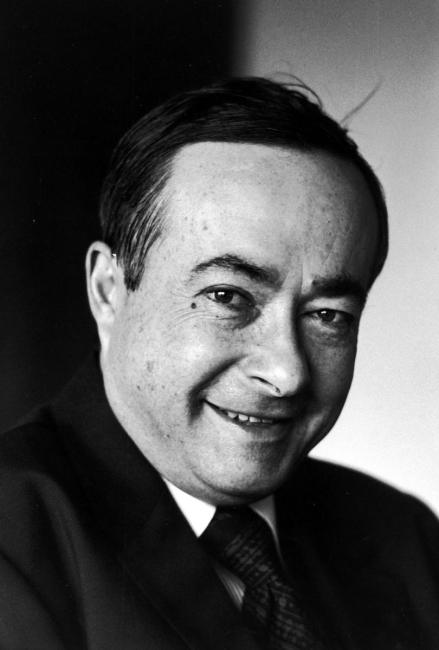You have /5 articles left.
Sign up for a free account or log in.

George Steiner
Getty Images
Looking up from a news app on her tablet Monday morning, my wife asked, “Do you know a literary critic named George Steiner?” It could only mean one of two things: either he was being honored with a major award or he had just died. The algorithms of newsworthiness made the second option more likely.
Yes, I knew him -- not personally, but as a reader. As relationships go, it was one-sided but complicated. My engagement with his work ran through three or four cycles of admiration and estrangement over about as many decades.
It was all too much to get into over breakfast. But in revisiting Steiner’s work this week, I find that old pattern (absorption, frustration, avoidance … renewed fascination) being recapitulated, sometimes in the course of reading a single essay.
Such ambivalence is not entirely idiosyncratic. Steiner’s “diverse writings on European literature and culture,” the poet and novelist Jay Parini said in The Hudson Review some years ago, “often seem incisive and intensely moral, as if the survival of value itself were at stake.” The characterization, while apt, comes with a demurral: Steiner’s work is also “plagued with inaccuracies, overly general statements, and pompous asides,” and the brio wears off when his prose spins out references and allusions by the yard, to little evident purpose. Erudition becomes a tic.
It was not noticeable at first. For me, the introduction to Steiner’s work came via Language and Silence: Essays on Language, Literature, and the Inhuman (1967). And leafing through my brittle Penguin copy of it now, hoping to quote something without the pages falling out, I’m struck by how much of Steiner’s subsequent work consists of revisitations of and variations on its themes. The paperback abridgment carries a more prosaic subtitle, “Essays 1958-1966,” which is unfortunate since “the inhuman” exactly names one of Steiner’s defining preoccupations.
Its most pressing significance is spelled out in the essay “A Kind of Survivor.” As a Jewish child born and raised in Paris in 1929, he owed his life to his parents’ good timing in leaving for America in 1940. “The black mystery of what happened in Europe,” he writes, “is to me indivisible from my own identity.” The mesh of personal, historical and theological threads in Steiner’s reflection is tightly woven and defies paraphrase. But one strand connects the essay to everything else he wrote known to me.
He identifies a few other survivors from the generation just before his own -- Theodor Adorno, Hannah Arendt, Ernst Bloch and Claude Levi-Strauss, among others -- and, in spite of their differences, took his bearings from their work. “It is these voices which seem to me contemporary,” he writes; they are figures “whose work and context of reference are indispensable to an understanding of the philosophic, political, aesthetic roots of the inhuman; of the paradox that modern barbarism sprang in some intimate, perhaps necessary way, from the very core and locale of humanistic civilization.”
That is one hell of a paradox. It could be boiled down into a troubling image: the concentration-camp guard who returned home at the end of the day to read Goethe or Rilke, or perhaps listened to chamber music broadcast on the radio, then returned to work the next day. Appreciation for monumental works of creativity need not inspire the slightest hesitation in carrying out routine depravities. History showed that the classics and the inhuman could -- and did -- cohabit without noticeable strain.
This argument did not make Steiner a cultural nihilist. On the contrary, his essays offered “[a] syllabus, if you will, of that Central European humanism, c. 1860-1930, which Nazism and Stalinism all but obliterated,” and his celebrations of the transformative encounter with literature are nothing if not ardent:
“In that great discourse with the living dead which we call reading,” he wrote in 1962, “our role is not a passive one … We engage the presence, the voice of the book. We allow it entry, though not unguarded, into our inmost. A great poem, a classic novel, press in upon us; they assail and occupy the strong places of our consciousness.”
The tension in Steiner between paradox (i.e., the humanities need not humanize) and dithyramb (his adoration of masterpieces) was at its most compelling in Language and Silence and palpable enough in writings from the following decade or so. But it weakens as he grows more and more preoccupied with his own exemplary status as Last Avatar of European High Culture. Over time, what felt more and more bothersome about this was less the vanity than the insularity -- the Euro-narcissism. The problem was not that he rejected the possibility that classic Chinese poetry or treatises by Buddhist logicians might “assail and occupy the strong places of our consciousness.” It just never comes up.
But cosmopolitan provincialism is the least of the problems with Steiner’s essay from 1981, “The Archives of Eden.” Reflecting at length on the historical dynamics and theological undercurrents of American culture, he finds it derivative of the European variety. The fact that the continent was inhabited for thousands of years prior before coming to any European’s attention somehow escapes his notice as well. The subsequent displacement and extermination of indigenous populations goes without mention, as does slavery. Once acutely aware of the inhuman, he somehow became indifferent to it, or at least he forgot the lines by Walter Benjamin that he must have once taken as a touchstone: "There is no document of civilization which is not at the same time a document of barbarism. And just as such a document is not free of barbarism, barbarism taints also the manner in which it was transmitted from one owner to another." I mourn the George Steiner who went missing a long time ago.




